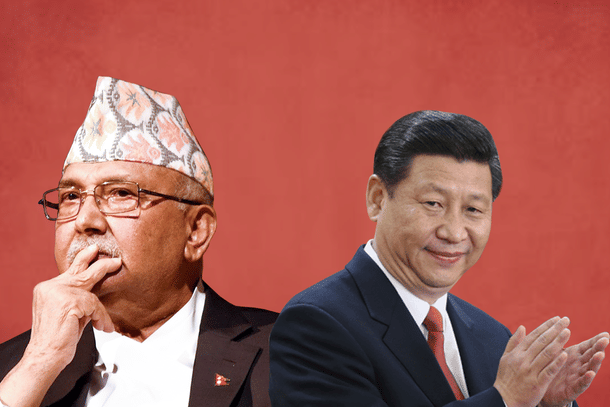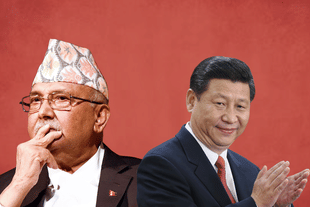World
China Wins Another Round In Nepal As Communist Rivals Join Hands Once Again To Form Government
Jaideep Mazumdar
Mar 06, 2024, 08:03 AM | Updated 09:14 AM IST
Save & read from anywhere!
Bookmark stories for easy access on any device or the Swarajya app.


The two major communist parties in Nepal, who have alternately been allies and bitter rivals, have joined hands once again to form a coalition government in the Himalayan nation.
This sudden development Monday (4 March) represents a victory for China, which has been trying its best to bring the two communist parties together.
China’s stooge — the Communist Party of Nepal (Unified Marxist Leninist)-CPN (UML) chairperson Khadga Prasad Sharma Oli, who is also viscerally anti-India and anti-US — will once again be in the driver’s seat in Nepal.
Prime Minister Pushpa Kamal Dahal, who is also the chairperson of the Communist Party of Nepal (Maoist Centre), dumped ally Nepali Congress (NC) Monday, before forming a new coalition with Oli’s party and the socialist Rastriya Swatantra Party (RSP).
The break in the alliance between the Maoists and the NC capped weeks of growing differences between the two parties that came together to form the government in December 2022 with Dahal as the Prime Minister.
Dahal and NC chairperson Sher Bahadur Deuba, had differed on dropping deputy prime minister and home minister Narayan Kaji Shrestha, finance minister Prakash Sharan Mahat, health minister Mohan Bahadur Basnet, transport minister Prakash Jwala and tourism minister Sudan Kirati.
While Mahat and Basnet are from the NC, Jwala is from the Communist Party of Nepal (Unified Socialist)-CPN (US) which was a minor partner in the government. Shrestha and Kirati are from Dahal’s own party.
Deuba wanted Shrestha and Kirati to go first, but Deuba wanted to drop the three others first before removing his own party colleagues from the cabinet.
The Maoists and the NC had also developed sharp differences over the post of chairman of the Rastriya Sabha (National Assembly), or the upper house of Parliament.
While the Maoists wanted their own candidate as the chairman, the NC announced its own candidate for the post and even declared that it would take Oli’s help, if necessary, to get its candidate elected to the post.
But, say leaders of the NC and the CPN (US), these and some other differences were not serious enough to warrant a break in the alliance.
“These differences were not very serious. In fact, we even offered to withdraw our candidate for the Rastriya Sabha chairman’s post and support the Maoist nominee. We were also willing to offer the finance ministry to the Maoists for the sake of keeping the alliance intact,” NC vice president Purna Bahadur Khadka, who was the deputy prime minister and the defence minister in the outgoing cabinet, told Swarajya.
According to outgoing health minister Mohan Bahadur Basnet, Dahal told Deuba in their last meeting Sunday (3 March) that he (Dahal) was under pressure to break the alliance with the NC.
“Dahal told our party chair (Deuba) that he was under a lot of pressure to join hands with the UML. He told Deuba that could no longer resist the pressure,” Basnet told Swarajya.
The pressure, obviously, came from China. In fact, say political observers, Beijing has stepped up its efforts to break the alliance between the NC and Maoists and get Dahal to join hands with its favourite, Oli, once again.
As had been said in this article published in Swarajya ten days ago, Beijing has been engaged in hectic efforts to checkmate other powers in Nepal by reinstating its own man, Oli, to power in the Himalayan nation.
The Chinese had always wanted Nepal’s two communist parties to join hands and unite. A strong and united communist party in Nepal, reckoned Beijing, will do China’s bidding. That will allow China to gain strategic depth in India’s backyard and use Nepal, like it does with Pakistan, to needle and checkmate India in South Asia.
The Chinese met with success before the 2017 parliamentary elections when the Dahal and Oli formed an electoral alliance and contested the elections together. The alliance swept the polls and the Chinese then brokered a merger between the two parties to form the Nepal Communist Party (NCP).
But Dahal and Oli soon developed differences over sharing power and the two fell apart, thus splintering the NCP. The NCP was dissolved in 2021 and in the 2022 parliamentary elections, the NC emerged as the single largest party, while Oli’s CPN-(UML) emerged as the second largest party and the Maoists were a distant third.
Dahal formed an alliance with the NC and the Unified Socialist to become the prime minister. But his personal ambitions and propensity to concentrate all power in his hands led to differences with his coalition partners.
China took full advantage of the developing differences between the constituents of the ruling alliance and even fuelled those differences.
Political observers in Nepal say that Beijing has a lot of leverage over Dahal due to his past transgressions. “China used these levers to apply pressure on Dahal and forced him to part ways with the NC,” said a leader of the CPN(US).
The NC has been clearly outwitted by Dahal. NC chairperson Deuba is said to have lamented to his close colleagues Monday that he should have accepted Oli’s overtures to dump the Maoists and form an alliance with the CPN(UML).
Oli, at Beijing’s behest, had been playing both Dahal and Deuba and offering to form alliances with both. While Deuba rejected those overtures for the sake of keeping the ruling alliance intact, Dahal had no such qualms.
Also, Oli realised that it would be much easier to keep Dahal, rather than Deuba, in line. The Maoists, being much weaker in Parliament than the CPN(UML), will have to bend to Oli’s wishes and he will be the real power behind the prime minister’s chair.
As for the prime minister’s chair, a new agreement between the Maoists and the CPN(UML) says that while Dahal will continue to occupy the top post till December 2025, Oli will replace him for the remaining two years (till December 2027) of the current Parliament’s term.
But while China may have won this round in the ongoing ‘great game’ in Nepal, there is no guarantee that the Oli-Dahal detente will last.
Political uncertainty and frequent alignments and fractures between political parties has plagued the country for many decades. Personal ambitions of politicians have led to the fall of governments and formation of new ones.
The latest coming together of Oli and Dahal, thus, marks the beginning of another interesting chapter in Nepal’s political history. But there’s no guarantee that this chapter will not be a short one.
Also Read: India Keeps Close Watch As China Revives Project To Reunite Nepal’s Communist Parties




